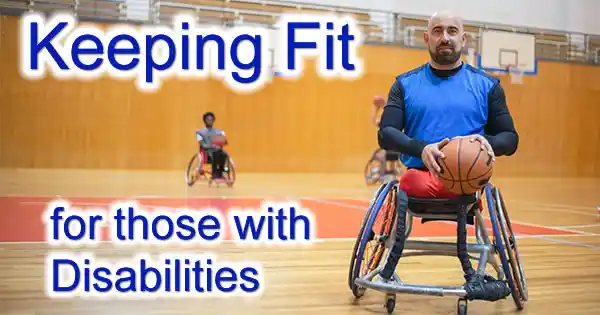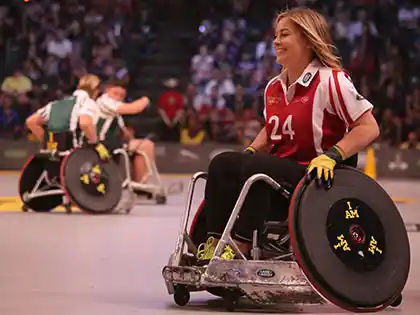How can those with Disabilities Stay Fit?
Exercise is important for everyone, especially individuals who have an injury or a disability. When you exercise, the body releases hormones called endorphins which relieve pain and provide a general sense of well-being. Exercise has a powerful effect on a person’s mood, increasing energy, relieving stress, raising self-esteem and combating depression.

Exercise is important for those who have an injury or a disability. Incorporating exercise into your daily routine may take time, but is well worth the effort.
According to the National Center of Health Statistics, 57% of adults between the ages of 18-64 with mobility disabilities and 40% of individuals with cognitive disabilities get no aerobic exercise, compared with 25% of people without disabilities who get no aerobic exercise.
The U.S. Department of Health and Human Services recommends that adults with disabilities should strive for a minimum of 150 minutes per week of moderate-intensity exercise or 75 minutes per week of vigorous intensity activity, or a combination of both, and two or more sessions per week of moderate to high intensity strength training. While some forms of exercise may be easier than others, depending on a person’s disability or injury, any exercise has health benefits.
Experts recommend that three different types of exercise be included into a consistent routine:
- Cardiovascular exercise to raise heart rate and increase endurance, such as walking, cycling, swimming, or water aerobics.
- Flexibility exercises to enhance range of motion, prevent injury and reduce pain and stiffness like yoga or stretching.
- Strength training exercise, using weights or resistance bands to build muscle and bone mass, improve balance and prevent falls.
It’s not surprising that people with disabilities tend to lead a less active lifestyle, given that may people with disabilities lack access to fitness resources and facilities.
If you have an injury, mobility disability, arthritis, breathing disorder, or any other ongoing medical condition that limits your activity, there are ways to overcome its challenges and experience the benefits of exercise. You may need to be creative in finding a workout that is appropriate for you so focus on what you can do. Some forms of exercise may not be possible or safe, but you may discover something new and find an exercise you really enjoy.
If you have been denied disability don’t give up! Contact a Disability lawyer at 512-454-4000 for a free consultation and get the benefits you deserve.
Where should you begin? First, ask your doctor, physical therapist, and other medical providers for guidance on types of exercise appropriate for you.
Find out how much exercise per day and week you need and what exercises you should avoid. If you are taking medications, know when you can take them so they do not conflict with your exercise schedule.
Search online for disability friendly resources.
YouTube has a variety of workout videos for low impact exercises, strength training and adaptive yoga designed especially for individuals with disabilities. Two examples are https://adaptiveyogalive.com and https://www.specialolympicsflorida.org/our-programs/health-fitness-programs/fit-5-program. If you are in a wheelchair, there are many exercises you can do, some using weights and resistance bands to maintain and develop strength. See, https://www.specialstrong.com/exercises-for-people-in-wheelchairs.
Find a personal trainer who understands your needs and goals who can help you create the ideal workout for you.
The National Academy of Sports Medicine and National Federation of Personal Trainers are excellent resources and can help match you with a skilled trainer. Also, many gyms have equipment suitable for people with a variety of abilities as well as personal trainers who can guide you in a workout program appropriate for you. If you are a Medicare recipient with a Part C Plan, you can benefit from memberships in health clubs and access to fitness programs designed to accommodate the needs of Medicare beneficiaries.

Begin slowly, starting with exercises you can do and gradually increasing your activity level.
Walking, water aerobics, swimming, tai chi and yoga are good low impact exercises and easy to incorporate into a daily routine. Avoid any activity that involves an injured body part; if you have a shoulder injury, focus on strengthening your legs and core while the injury heals. When you return to your normal routine, start with lighter weights and less resistance. Stop exercising if you experience pain, nausea, dizziness, lightheadedness, or shortness of breath. You may need to do short, frequent workouts; for example, instead of 15 minutes of exercise, reduce the time to 5 or 10 minutes.
Wear supportive shoes and comfortable clothes that don’t restrict movement and don’t forget to warm up, stretch and cool down.
Drink plenty of water and eat the right food for you; consult a dietician if you need advice. This is especially important if you must follow a restrictive diet.
To get the maximum benefit of any workout routine, make exercise a daily habit.
Exercise at the same time each day, focusing on short term goals and doing a variety of exercises. Work out while listening to music or watching TV or exercise with friends. It takes about a month to create a new habit, but expect setbacks and don’t be discouraged if you miss a day, a week, or even a few weeks. Just pick up where you left off and keep going. Incorporating exercise into your daily routine may take time, but is well worth the effort.
Disability benefits are an important source of income for those who are unable to work. If you are not able to work due to accident or illness, you may be eligible for Social Security Disability or Long Term Disability benefits. If you have applied for benefits and been denied, contact the attorneys at Bemis, Roach and Reed for a free consultation. Call 512-454-4000 and get help NOW.
Making Your Living Space Disability Friendly
Should I disclose my Disability at a Job Interview?
Travel and Vacation Tips for People with Disabilities
Author: Attorney Greg Reed has been practicing law for 29 years. He is Superlawyers rated by Thomson Reuters and is Top AV Preeminent® and Client Champion Gold rated by Martindale Hubbell. Through his extensive litigation Mr. Reed obtained board certification from the Texas Board of Legal Specialization. Greg is admitted to practice in the United States District Court - all Texas Districts and the United States Court of Appeals-Fifth Circuit. Mr. Reed is a member of the Travis County Bar Association, Texas Trial Lawyers Association, past Director of the Capital Area Trial Lawyers Association, and an Associate member of the American Board of Trial Advocates. Mr. Reed and all the members of Bemis, Roach & Reed have been active participants in the Travis County Lawyer referral service.
Your Free Initial Consultation
Call now:
At Bemis, Roach and Reed, if we can't help you, we will try to find the right attorneys for you.
We offer each of our prospective clients a free no obligation one hour phone or office consultation to see if we can help you and if you are comfortable with us. We know how difficult a time like this can be and how hard the decisions are. If we can be of assistance to you and help you find a solution to your issue we will even if that means referring you to another attorney.
Let's get you Started:
If you could provide us with some basic information about your claim we will get right back with you with a free case evaluation and schedule your Free Consultation Today.







